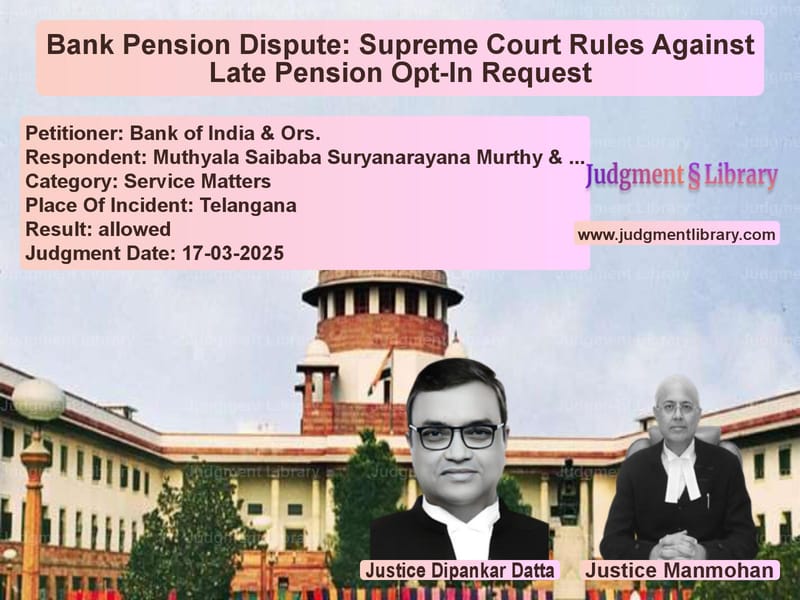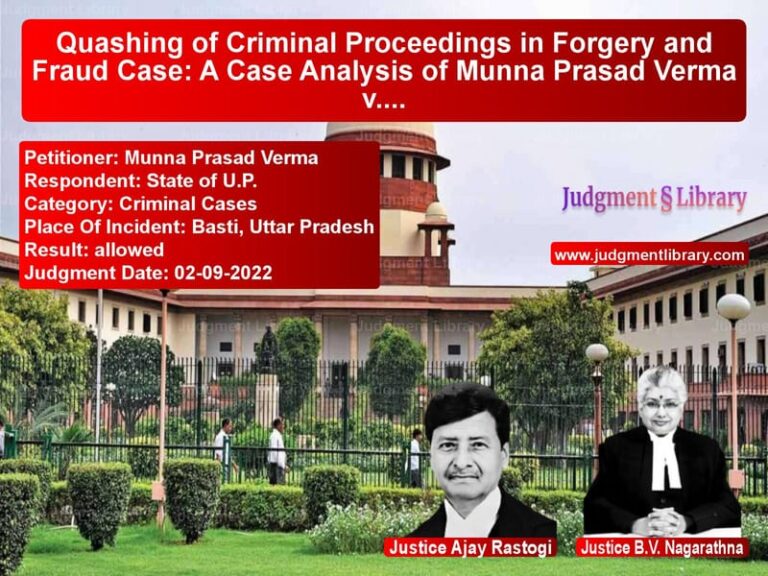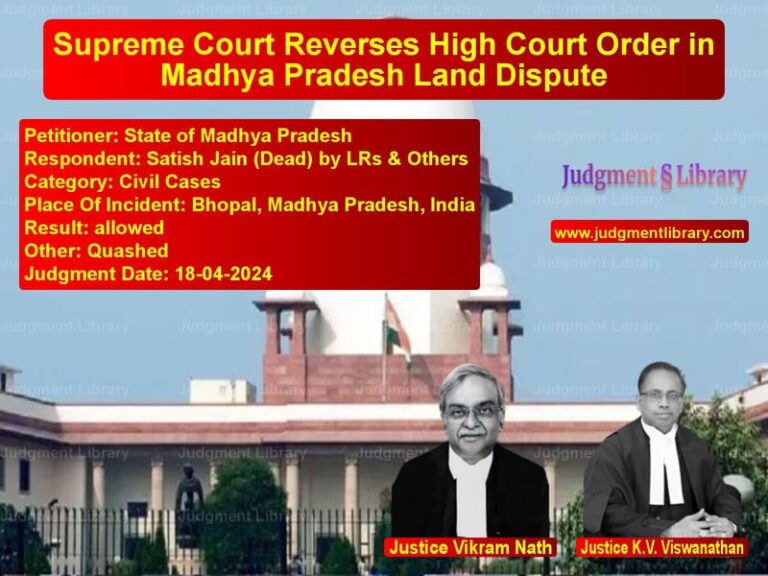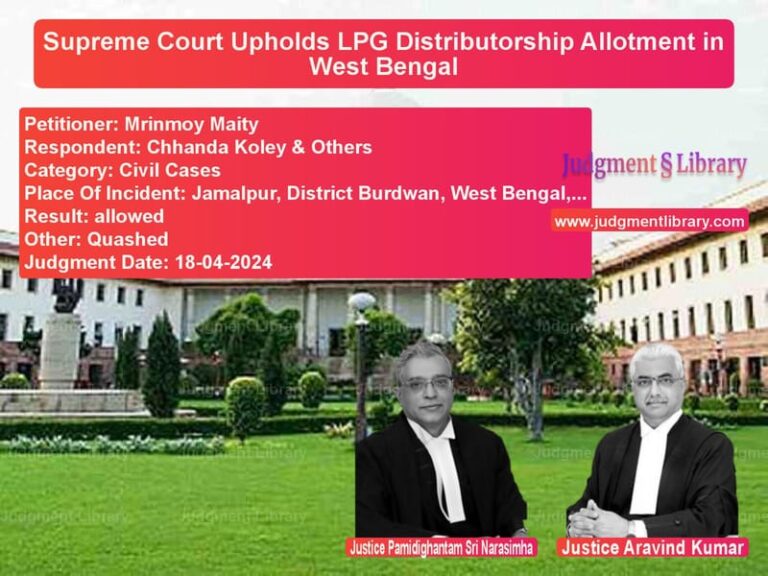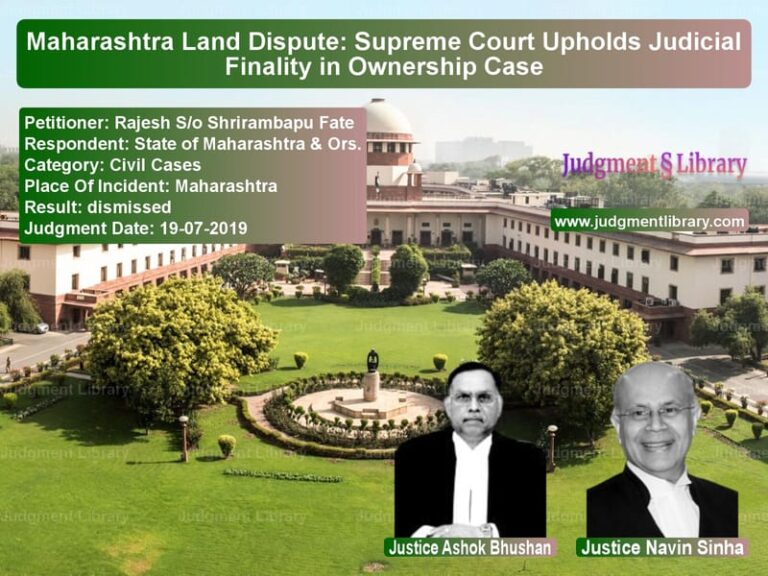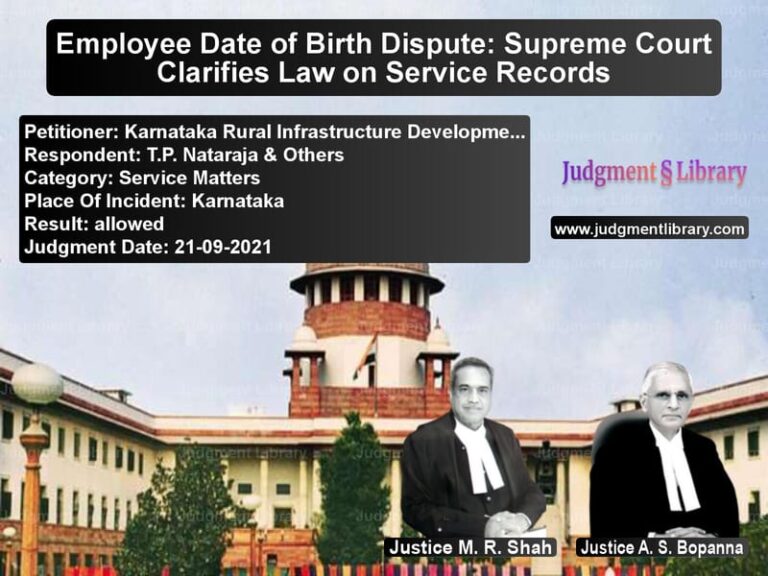Bank Pension Dispute: Supreme Court Rules Against Late Pension Opt-In Request
In a major ruling concerning pension eligibility, the Supreme Court of India ruled in favor of the Bank of India (BoI) in Bank of India & Ors. vs. Muthyala Saibaba Suryanarayana Murthy & Anr.. The decision overturned a Telangana High Court ruling that allowed a retired employee to opt into the pension scheme years after the deadline had expired.
The case raised crucial legal questions about employer discretion in setting deadlines for pension benefits and the extent to which courts can intervene in such matters.
Background of the Case
The dispute began when the respondent, Muthyala Saibaba Suryanarayana Murthy, a former employee of BoI, sought to opt into the bank’s pension scheme years after his voluntary retirement. Murthy had retired on December 30, 2000, after serving the bank for 25 years.
In 2010, BoI issued Circular No. 104/645, inviting retired employees to opt into the Bank of India (Employees’) Pension Scheme, 1995. This option was available to those who had retired before April 27, 2010. The window for opting in was open between September 1, 2010, and October 30, 2010.
Murthy, however, failed to apply within this period. He claimed that he was unaware of the circular because he had been in the United States at the time and later underwent surgery in October 2010. He only submitted his pension application on March 19, 2011, more than four months after the deadline had passed. BoI rejected his request.
Murthy then filed a writ petition before the Telangana High Court, challenging the bank’s refusal to accept his delayed application. A Single Judge of the High Court dismissed the petition, ruling that the deadline was legally binding. However, on appeal, a Division Bench of the High Court ruled in favor of Murthy, holding that the pension policy was beneficial in nature and that the bank should have considered his application despite the delay.
The bank then appealed to the Supreme Court.
Petitioner’s Arguments (Bank of India)
- The bank had widely publicized the pension option through newspapers and branches, fulfilling its duty to inform retirees.
- Murthy was in India well before the deadline and could have exercised due diligence to become aware of the policy.
- The High Court’s ruling ignored the importance of maintaining deadlines for financial policies.
- Allowing a belated application would create a precedent that could disrupt the entire pension system.
Respondent’s Arguments (Murthy)
- The pension policy was beneficial in nature, and its rigid enforcement violated principles of fairness.
- Murthy had been in the United States when the circular was issued and was unable to apply on time.
- The surgery he underwent in early October 2010 prevented him from applying before the deadline.
- Since he had met all other eligibility criteria, the delay should be condoned in the interest of justice.
Supreme Court’s Key Observations
The Supreme Court examined whether Murthy’s failure to apply within the deadline justified an exception. The Court ruled:
“Whenever a policy is formulated, which is beneficial in nature for the subjects to be governed thereby but, at the same time, prescribes a time limit for the subjects to act, it is not and cannot be the law that the proposed benefits can be availed of by a subject beyond the stipulated period and at any time in future suiting his convenience.”
“The Division Bench, in course of its interference with the order dismissing the writ petition, failed to realize that in exercise of writ powers under Article 226 of the Constitution, the high courts of the country do not come to the aid of the tardy, the indolent, and the lethargic.”
The Court emphasized that deadlines in financial policies cannot be treated as flexible guidelines.
Most Important Verbatim Arguments from the Judgment
“It is the admitted case of the first respondent that he had returned to India from the United States of America on 1st September, 2010. However, he was not diligent enough to make himself aware of the developments touching his interest while he was abroad.”
“The harm or loss arising out of failure of the first respondent to opt for the pension scheme was not wrongful in the eye of law since it is he who had to be blamed for the situation where he found himself.”
“The employer cannot presume that all the retirees have settled in the city where the head office is located. If the employees belong to the services of the Central Government or its agencies/instrumentalities, they are likely to settle in their native places which may be far away from the seat of the Government or head office of the establishment or organisation.”
The Court ruled that while pension schemes are beneficial in nature, they must still adhere to prescribed deadlines. Allowing late applications could lead to endless litigation and financial instability.
Final Judgment and Conclusion
The Supreme Court reversed the Telangana High Court’s ruling and reinstated the original decision of the Single Judge. The key takeaways from the judgment were:
- Deadlines in pension schemes must be respected, even if the scheme is beneficial.
- Murthy had ample time to apply and failed to act diligently.
- The High Court had no legal basis to intervene in a matter where no fundamental right was violated.
- Courts must not create policy exceptions that could destabilize financial systems.
With this ruling, the Supreme Court reinforced that procedural deadlines serve an essential function in financial governance. The judgment serves as a reminder that pensioners must adhere to deadlines to avoid losing their benefits.
Petitioner Name: Bank of India & Ors..Respondent Name: Muthyala Saibaba Suryanarayana Murthy & Anr..Judgment By: Justice Dipankar Datta, Justice Manmohan.Place Of Incident: Telangana.Judgment Date: 17-03-2025.
Don’t miss out on the full details! Download the complete judgment in PDF format below and gain valuable insights instantly!
Download Judgment: bank-of-india-&-ors.-vs-muthyala-saibaba-sur-supreme-court-of-india-judgment-dated-17-03-2025.pdf
Directly Download Judgment: Directly download this Judgment
See all petitions in Pension and Gratuity
See all petitions in Public Sector Employees
See all petitions in Employment Disputes
See all petitions in Judgment by Dipankar Datta
See all petitions in Judgment by Manmohan
See all petitions in allowed
See all petitions in supreme court of India judgments March 2025
See all petitions in 2025 judgments
See all posts in Service Matters Category
See all allowed petitions in Service Matters Category
See all Dismissed petitions in Service Matters Category
See all partially allowed petitions in Service Matters Category

